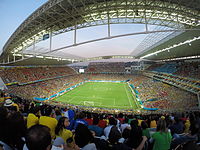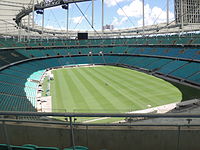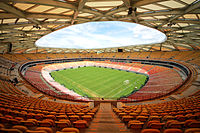Category Archives: Football
Football at the 2016 Summer Olympics
 |
|
| Tournament details | |
|---|---|
| Host country | |
| Dates | 3–20 August |
| Teams | 16 (men) + 12 (women) (from 6 confederations) |
| Venue(s) | 7 (in 6 host cities) |
| Final positions | |
| Champions | |
| Runners-up | |
| Third place | |
| Fourth place | |
| Football at the 2016 Summer Olympics  |
|---|
| Tournament |
| men women |
| Squads |
| men women |
The association football tournament at the 2016 Summer Olympics was held from 3 to 20 August in Brazil.[1]
In addition to the Olympic host city of Rio de Janeiro, matches were also played in Belo Horizonte, Brasília, Salvador, São Paulo, and Manaus. All six cities hosted matches during the 2014 World Cup, with the Estádio Olímpico João Havelange in Rio the only Olympic venue not to have been a World Cup venue.[2][3]
Associations affiliated with FIFA might send teams to participate in the tournament. Men’s teams were restricted to under-23 players (born on or after 1 January 1993) with a maximum of three overage players allowed, while there were no age restrictions on women’s teams.[4] The Games made use of about 400 footballs.
Competition schedule[edit]
The match schedule of the men’s and women’s tournament was unveiled on 10 November 2015.[6][7]
| GS | Group stage | QF | Quarterfinals | SF | Semifinals | B | 3rd place play-off | F | Final |
|
Date
Event
|
Wed 3 | Thu 4 | Fri 5 | Sat 6 | Sun 7 | Mon 8 | Tue 9 | Wed 10 | Thu 11 | Fri 12 | Sat 13 | Sun 14 | Mon 15 | Tue 16 | Wed 17 | Thu 18 | Fri 19 | Sat 20 | ||
|---|---|---|---|---|---|---|---|---|---|---|---|---|---|---|---|---|---|---|---|---|
| Men | GS | GS | GS | QF | SF | B | F | |||||||||||||
| Women | GS | GS | GS | QF | SF | B | F | |||||||||||||
Venues[edit]
Rio de Janeiro hosted preliminary matches at the Estádio Olímpico João Havelange and the women’s and men’s final at theMaracanã Stadium on 19 and 20 August. Apart from Rio de Janeiro the five other cities were: São Paulo, Belo Horizonte,Brasília, Salvador, and Manaus, which were all host cities during the 2014 FIFA World Cup.[2] The final choice of venues was announced by FIFA on 16 March 2015.[3]
| Rio de Janeiro, Rio de Janeiro | Brasília, Distrito Federal | São Paulo, São Paulo | |
|---|---|---|---|
| Maracanã | Estádio Olímpico | Estádio Nacional Mané Garrincha | Arena Corinthians |
| 15°47′0.6″S 47°53′56.99″W | 23°32′43.91″S 46°28′24.14″W | 22°53′35.42″S 43°17′32.17″W | 22°54′43.8″S 43°13′48.59″W |
| Capacity: 74,738[8] Renovated for the 2014 World Cup |
Capacity: 60,000 Renovated for the 2016 Olympics |
Capacity: 69,349[8] Renovated for the 2014 World Cup |
Capacity: 48,234[8] New stadium for the 2014 World Cup |
 |
 |
 |
 |
| Belo Horizonte, Minas Gerais | |||
| Mineirão | |||
| 19°51′57″S 43°58′15″W | |||
| Capacity: 58,170[8] Renovated for the 2014 World Cup |
|||
 |
|||
| Salvador, Bahia | |||
| Itaipava Arena Fonte Nova | |||
| 12°58′43″S 38°30′15″W | |||
| Capacity: 51,900[8] New stadium for the 2014 World Cup |
|||
 |
|||
| Manaus, Amazonas | |||
| Arena da Amazônia | |||
| 3°4′59″S 60°1′41″W | |||
| Capacity: 40,549[8] New stadium for the 2014 World Cup |
|||
 |
|||
Training venues[edit]
| Event stadium | Training venue #1 | Training venue #2 | Training venue #3 | Training venue #4 |
|---|---|---|---|---|
| Maracanã | CFZ Stadium | Vasco Barra Football Club | Juliano Moreira Sports Complex | N/A |
| Estádio Nacional Mané Garrincha | Cave Stadium | Minas Brasília Tennis Club | Yacht Club of Brasília | Cruzeiro Stadium |
| Mineirão | Toca da Raposa 1 | Toca da Raposa 2 | Cidade do Galo | América F.C.Training Center |
| Itaipava Arena Fonte Nova | Parque Santiago Stadium | Pituaçu Stadium | Barradão Stadium | E.C. Bahia Training Center |
| Arena Corinthians | São Paulo F.C.Training Center | S.E. PalmeirasTraining Center | C.A. Juventus Stadium | Nacional A.C. Stadium |
Qualification[edit]
Men’s qualification[edit]
In addition to host nation Brazil, 15 men’s national teams qualified from six separate continental confederations. FIFA ratified the distribution of spots at the Executive Committee meeting in March 2014.[9]
| Means of qualification | Dates1 | Venue1 | Berths | Qualified |
|---|---|---|---|---|
| Host country | 2 October 2009 | 1 | ||
| 2015 South American Youth Championship[10] | 14 January – 7 February 2015 | 1 | ||
| 2015 UEFA European Under-21 Championship[11] | 17–30 June 2015 | 4 | ||
| 2015 Pacific Games[12] | 3–17 July 2015 | 1 | ||
| 2015 CONCACAF Olympic Qualifying Championship[13] | 1–13 October 2015 | 2 | ||
| 2015 Africa U-23 Cup of Nations[14] | 28 November – 12 December 2015 | 3 | ||
| 2016 AFC U-23 Championship[15] | 12–30 January 2016 | 3 | ||
| 2016 CONCACAF–CONMEBOL play-off | 25–29 March 2016 | Various (home and away)3 | 1 | |
| Total | 16 | |||
- ^1 Dates and venues are those of final tournaments (or final round of qualification tournaments), various qualification stages may precede matches at these specific venues.
- ^2 Nations making their Olympic tournament debut
- ^3 One match each in Colombia and United States in a two-legged tie.
Women’s qualification[edit]
In addition to host nation Brazil, 11 women’s national teams qualified from six separate continental confederations. FIFA ratified the distribution of spots at the Executive Committee meeting in March 2014.[9] Most continents use specific Olympic qualifying tournaments to allocate their spots, but two use slightly different procedures.
CONMEBOL used the Copa América to determine its Olympic entrant. Because the Olympic host, Brazil, won the Copa América, the runner-up (Colombia) qualified for the Olympics.
UEFA generally uses the World Cup to determine its Olympic entrants. The top 3 finishers at the World Cup, excluding England, qualified. When multiple European teams were eliminated in the same round and this results in a tie for an Olympic qualifying spot, an Olympic Qualifying Tournament was used to break the tie. For these Games, Germany and France both reached at least the quarterfinals and thus obtained qualification spots (England also did so, but was ineligible for Olympic play). The next best finish for European teams was a four-way tie among the Netherlands, Norway, Sweden, and Switzerland, which each lost in the round of 16. Those four teams competed in a separate tournament to break that tie, won by Sweden.
| Means of qualification | Dates4 | Venue4 | Berths | Qualified | |
|---|---|---|---|---|---|
| Host country | 2 October 2009 | 1 | |||
| 2014 Copa América[16] | 11–28 September 2014 | 1 | |||
| 2015 FIFA World Cup[17] (for UEFA eligible teams)5 |
6 June – 5 July 2015 | 2 | |||
| 2015 CAF Olympic Qualifying Tournament[14] | 2–18 October 2015 | Various (home and away) | 2 | ||
| 2016 OFC Olympic Qualifying Tournament[12] | 23 January 2016 | 1 | |||
| 2016 CONCACAF Olympic Qualifying Championship[18] | 10–21 February 2016 | 2 | |||
| 2016 AFC Olympic Qualifying Tournament[19] | 29 February – 9 March 2016 | 2 | |||
| 2016 UEFA Olympic Qualifying Tournament[21] | 2–9 March 2016 | 1 | |||
| Total | 12 | ||||
- ^4 Dates and venues are those of final tournaments (or final round of qualification tournaments), various qualification stages may precede matches at these specific venues.
- ^5 England finished in the top three among UEFA teams in the World Cup, however England is not an IOC member and talks for them to compete as Great Britain broke down.
- ^6 Nations making their Olympic tournament debut
Men’s competition[edit]
2016 Summer Olympic Games livery nearEstádio Nacional Mané Garrincha, Brasília, venue for several men’s and women’s competitions.
The competition consisted of two stages; a group stage followed by a knockout stage.
Group stage[edit]
Teams were divided into four groups of four countries, playing each team in their group once. Three points were awarded for a victory, one for a draw. The top two teams per group qualified for the quarterfinals.
Group A[edit]
| Pos | Team | Pld | W | D | L | GF | GA | GD | Pts | Qualification |
|---|---|---|---|---|---|---|---|---|---|---|
| 1 | 3 | 1 | 2 | 0 | 4 | 0 | +4 | 5 | Quarter-finals | |
| 2 | 3 | 1 | 1 | 1 | 1 | 4 | −3 | 4 | ||
| 3 | 3 | 0 | 3 | 0 | 1 | 1 | 0 | 3 | ||
| 4 | 3 | 0 | 2 | 1 | 1 | 2 | −1 | 2 |
Group B[edit]
| Pos | Team | Pld | W | D | L | GF | GA | GD | Pts | Qualification |
|---|---|---|---|---|---|---|---|---|---|---|
| 1 | 3 | 2 | 0 | 1 | 6 | 6 | 0 | 6 | Quarter-finals | |
| 2 | 3 | 1 | 2 | 0 | 6 | 4 | +2 | 5 | ||
| 3 | 3 | 1 | 1 | 1 | 7 | 7 | 0 | 4 | ||
| 4 | 3 | 0 | 1 | 2 | 2 | 4 | −2 | 1 |
Group C[edit]
| Pos | Team | Pld | W | D | L | GF | GA | GD | Pts | Qualification |
|---|---|---|---|---|---|---|---|---|---|---|
| 1 | 3 | 2 | 1 | 0 | 12 | 3 | +9 | 7 | Quarter-finals | |
| 2 | 3 | 1 | 2 | 0 | 15 | 5 | +10 | 5 | ||
| 3 | 3 | 1 | 1 | 1 | 7 | 4 | +3 | 4 | ||
| 4 | 3 | 0 | 0 | 3 | 1 | 23 | −22 | 0 |
Group D[edit]
| Pos | Team | Pld | W | D | L | GF | GA | GD | Pts | Qualification |
|---|---|---|---|---|---|---|---|---|---|---|
| 1 | 3 | 2 | 1 | 0 | 5 | 2 | +3 | 7 | Quarter-finals | |
| 2 | 3 | 1 | 1 | 1 | 5 | 5 | 0 | 4 | ||
| 3 | 3 | 1 | 1 | 1 | 3 | 4 | −1 | 4 | ||
| 4 | 3 | 0 | 1 | 2 | 4 | 6 | −2 | 1 |
Knockout stage[edit]
| Quarter-finals | Semi-finals | Gold medal match | ||||||||
| 13 August — São Paulo | ||||||||||
| 2 | ||||||||||
| 17 August — Rio de Janeiro | ||||||||||
| 0 | ||||||||||
| 6 | ||||||||||
| 13 August — Belo Horizonte | ||||||||||
| 0 | ||||||||||
| 0 | ||||||||||
| 20 August — Rio de Janeiro | ||||||||||
| 1 | ||||||||||
| 1 (5) | ||||||||||
| 13 August — Salvador | ||||||||||
| 1 (4) | ||||||||||
| 2 | ||||||||||
| 17 August — São Paulo | ||||||||||
| 0 | ||||||||||
| 0 | ||||||||||
| 13 August — Brasília | ||||||||||
| 2 | Bronze medal match | |||||||||
| 0 | ||||||||||
| 20 August — Belo Horizonte | ||||||||||
| 4 | ||||||||||
| 2 | ||||||||||
| 3 | ||||||||||
Women’s competition[edit]
The competition consisted of two stages; a group stage followed by a knockout stage.
Group stage[edit]
Teams were divided into three groups of four countries, playing each team in their group once. Three points were awarded for a victory, one for a draw. The top two teams per group and best two third-placed teams qualified for the quarterfinals.
Group E[edit]
| Pos | Team | Pld | W | D | L | GF | GA | GD | Pts | Qualification |
|---|---|---|---|---|---|---|---|---|---|---|
| 1 | 3 | 2 | 1 | 0 | 8 | 1 | +7 | 7 | Quarter-finals | |
| 2 | 3 | 1 | 1 | 1 | 2 | 3 | −1 | 4 | ||
| 3 | 3 | 1 | 1 | 1 | 2 | 5 | −3 | 4 | ||
| 4 | 3 | 0 | 1 | 2 | 0 | 3 | −3 | 1 |
Group F[edit]
| Pos | Team | Pld | W | D | L | GF | GA | GD | Pts | Qualification |
|---|---|---|---|---|---|---|---|---|---|---|
| 1 | 3 | 3 | 0 | 0 | 7 | 2 | +5 | 9 | Quarter-finals | |
| 2 | 3 | 1 | 1 | 1 | 9 | 5 | +4 | 4 | ||
| 3 | 3 | 1 | 1 | 1 | 8 | 5 | +3 | 4 | ||
| 4 | 3 | 0 | 0 | 3 | 3 | 15 | −12 | 0 |
Group G[edit]
| Pos | Team | Pld | W | D | L | GF | GA | GD | Pts | Qualification |
|---|---|---|---|---|---|---|---|---|---|---|
| 1 | 3 | 2 | 1 | 0 | 5 | 2 | +3 | 7 | Quarter-finals | |
| 2 | 3 | 2 | 0 | 1 | 7 | 1 | +6 | 6 | ||
| 3 | 3 | 1 | 0 | 2 | 1 | 5 | −4 | 3 | ||
| 4 | 3 | 0 | 1 | 2 | 2 | 7 | −5 | 1 |
Knockout stage[edit]
| Quarter-finals | Semi-finals | Gold medal match | ||||||||
| 12 August — Belo Horizonte | ||||||||||
| 0 (7) | ||||||||||
| 16 August — Rio de Janeiro (Mar.) | ||||||||||
| 0 (6) | ||||||||||
| 0 (3) | ||||||||||
| 12 August — Brasília | ||||||||||
| 0 (4) | ||||||||||
| 1 (3) | ||||||||||
| 19 August — Rio de Janeiro (Mar.) | ||||||||||
| 1 (4) | ||||||||||
| 1 | ||||||||||
| 12 August — São Paulo | ||||||||||
| 2 | ||||||||||
| 1 | ||||||||||
| 16 August — Belo Horizonte | ||||||||||
| 0 | ||||||||||
| 0 | ||||||||||
| 12 August — Salvador | ||||||||||
| 2 | Bronze medal match | |||||||||
| 0 | ||||||||||
| 19 August — São Paulo | ||||||||||
| 1 | ||||||||||
| 1 | ||||||||||
| 2 | ||||||||||
Medal summary[edit]
Medal table[edit]
Key * Host nation (Brazil)
| Rank | Nation | Gold | Silver | Bronze | Total |
|---|---|---|---|---|---|
| 1 | 1 | 1 | 0 | 2 | |
| 2 | 1 | 0 | 0 | 1 | |
| 3 | 0 | 1 | 0 | 1 | |
| 4 | 0 | 0 | 1 | 1 | |
| 0 | 0 | 1 | 1 | ||
| Total | 2 | 2 | 2 | 6 | |


